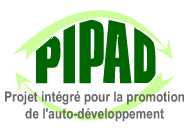







 |
 |
 |
 |
 |
 |
 |
 |
|
||||||
|
PIPAD has been active in water, sanitation and hygiene for over 3 years. The organization began experimenting with hygiene and sanitation activities, more recently branching into water supply projects. PIPAD uses a holistic approach to water, sanitation, and hygiene by integrating these three areas into each project. We believe this is the only way to reduce morbidity and mortality rates related to fecal and water-borne diseases such as cholera, typhoid, intestinal parasites and diarrhea. Around the world diarrhea kills over 3 million people a year, most of whom are children. PIPAD is making a difference in the lives of ordinary people in Cameroon. To date, projects have been carried out in 21 villages, 113 latrines have been built at homes and in schools, 1 water source has been constructed and 21 hygiene committees are active as a result of the hygiene activities carried out. The most recent project is active in 15 villages. This includes 6 villages where follow-up is being carried out, and 9 villages that are new to PIPAD. The activities undertaken include:
Hygiene Promotion
Sanitation
Water Supply |
||||||
We gratefully acknowledge support from: |
|||||
| Eglise Valdese, Italy | Eglise Luthérienne, Italy | Université de Rome Sapienza, Italy | Ingénieurs Sans Frontières, Canada | Canadian International Development Agency (CIDA)/ Agence Canadienne pour le Développement Internationale (ACDI) | Food and Agriculture Organization of the UN (FAO) |
| Individual private donors in Canada, UK, Cameroon and Italy | AfricaOnlus - Italy | ANLAIDS - Italy | WaterLife - USA | Nurses Association of Toronto - Canada | Kings of Foto, Bapa, Bayangam and Basso-Balessing - Cameroon |
| Home | Projects | Volunteer | Donate | People | Donors | Contact |VERSION FRANCAIS | |||||